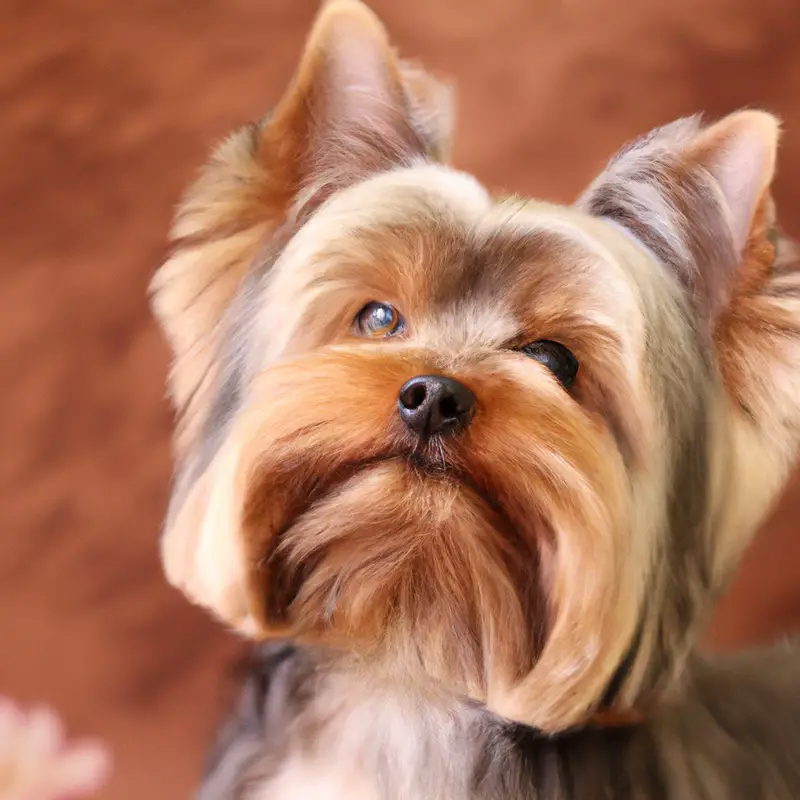Are Yorkshire Terriers Good Guard Dogs?
Key Takeaways:
- Yorkshire Terriers are not typically considered good guard dogs.
- They may have a tendency to bark a lot, but are not usually effective at deterring intruders.
- Their small size and friendly nature make them more suitable as companion pets rather than guard dogs.
- Proper training and socialization can help Yorkshire Terriers exhibit more protective behaviors.
Are Yorkshire Terriers good guard dogs? You might be surprised by the answer.
As an expert in dog breeds, I’ve seen Yorkshire Terriers earn a reputation for being adorable lap dogs.
But don’t let their small size fool you – these pint-sized pups can pack a punch when it comes to protecting their loved ones. In this article, we’ll explore the history and physical characteristics of Yorkshire Terriers, dive into their temperament, and assess their guarding abilities.
So if you’re considering a Yorkshire Terrier as a guard dog, read on to discover if they have what it takes to be your reliable and vigilant protector.
Prepare to be pleasantly surprised!
| Factors | Yorkshire Terriers |
| Breed Size | Small |
| Appearance | Toy Terrier with long silky hair |
| Temperament | Friendly, affectionate, and lively |
| Trainability | Moderate, can be stubborn at times |
| Protectiveness | Alert but not naturally aggressive |
| Barking Tendency | High, may bark at strangers |
| Watchdog Ability | Will alert owners to potential dangers |
| Guard Dog Ability | Not suitable for guarding purposes |
The Yorkshire Terrier Breed
History and Origins of the Yorkshire Terrier
The Yorkshire Terrier, or Yorkie for short, has a rich history and fascinating origins. These small, but mighty, dogs were originally bred in England during the 19th century.
They were developed specifically to catch rats and mice in the textile mills of Yorkshire, hence their name.
Yorkies were created by crossing various terrier breeds, including the now-extinct Waterside Terrier and the Manchester Terrier. It is believed that Maltese, Skye Terrier, and Dandie Dinmont Terrier may have also contributed to their heritage.
This mix of breeds resulted in the distinctive appearance and personality traits that we associate with Yorkies today.
Originally, Yorkies were larger in size. However, over time breeders selectively bred them to be smaller, focusing on their cute and compact appearance.
As a result, Yorkies became popular companion dogs, valued for their charming personality and loyalty.
Fun fact: Yorkies were first recognized as a breed by the American Kennel Club in 1885. They quickly gained popularity not only in England and the United States but also around the world.
Physical Characteristics of Yorkshire Terriers
Yorkshire Terriers are small-sized dogs with a distinct appearance. They have a compact and well-proportioned body, standing about 6-9 inches tall and weighing around 4-7 pounds.
These adorable pooches possess a long and silky coat that is hypoallergenic and does not shed much.
Their coat comes in various colors, including blue and tan, black and tan, and gold and tan. One notable feature of Yorkshire Terriers is their small, V-shaped ears that stand erect on top of their head.
They also have round, dark eyes that are full of expression.
Another characteristic that sets them apart is their docked tail, which is typically held high. While their appearance may seem delicate, their sturdy build makes them quite resilient.
Despite their small size, Yorkshire Terriers have a confident and alert stance.
Their overall appearance exudes an air of elegance and self-assurance. These dogs make for delightful companions and are often seen as fashion accessories due to their stylish coats and compact bodies.
However, beneath their glamorous exterior, they possess a feisty and curious nature that adds to their charm.

Temperament and Personality Traits of Yorkshire Terriers
Yorkshire Terriers, or Yorkies, are known for their lively and outgoing personalities. They are small in size but big in attitude! One of the notable traits of this breed is their confidence, which often makes them fearless and bold.
Don’t be surprised if your Yorkie takes charge and thinks they’re the boss of the house! Despite their small stature, Yorkshire Terriers can be quite energetic and playful.
They love to be involved in activities and enjoy playing games with their owners. They have a curious nature and are often eager to explore their surroundings.
This makes them a fun and entertaining companion to have around.
Another aspect of their temperament is their loyalty and affection towards their family. Yorkies are known to have a strong bond with their owners and thrive on human companionship.
They make great lap dogs and love to snuggle up for some quality cuddle time.
Yorkshire Terriers are also intelligent and quick learners. With the right training and socialization, they can be well-behaved and obedient.
However, their strong-willed nature might make them a challenge for first-time dog owners.
Consistency and patience in training are essential to ensure they understand the rules and boundaries. While Yorkies can be friendly and sociable, they can also be wary of strangers.
They have a natural instinct to protect their loved ones and can be quite vocal when they sense any potential threats.
However, it’s important to note that their size might limit their effectiveness as guard dogs.

Yorkshire Terriers as Guard Dogs
Assessing the Guarding Instinct of Yorkshire Terriers
Assessing the Guarding Instinct of Yorkshire Terriers To determine if Yorkshire Terriers have a guarding instinct, there are a few key factors to consider. First, observe their behavior towards strangers.
Do they bark or show signs of protectiveness?
Yorkshire Terriers are known to be alert and wary of strangers, which can make them good watchdogs. Additionally, pay attention to their territorial nature.
Are they possessive of their space and belongings?
Yorkshire Terriers are known to be protective of their territory and can become vocal if they feel their space is being invaded. Another aspect to consider is their size.
While Yorkshire Terriers may not be intimidating in terms of physical appearance, their high-pitched bark can serve as a deterrent to potential intruders.
Lastly, it’s important to note that not all Yorkshire Terriers will naturally exhibit strong guarding instincts. Genetics and upbringing play a role.
Early socialization and training can help shape their behavior and enhance their guarding abilities.
Ultimately, while Yorkshire Terriers may not be the stereotypical guard dogs, their alertness, protectiveness, and vocal nature can make them effective watchdogs in the right circumstances.

Size and Intimidation Factor
Size and Intimidation Factor When considering whether Yorkshire Terriers make good guard dogs, one crucial aspect to take into account is their size and intimidation factor. First and foremost, Yorkshire Terriers are small dogs, typically weighing only around 4 to 7 pounds.
Their tiny size may deter some intruders, as they could be seen as a less imposing threat compared to larger breeds.
However, it’s important to note that size doesn’t always determine a dog’s ability to protect their home. Yorkshire Terriers may compensate for their small stature with their fierce and spirited personality.
They can be surprisingly assertive and vocal when it comes to protecting their territory, often barking loudly to alert their owners of any possible threats.
Ultimately, while their size may be a disadvantage in terms of physical intimidation, Yorkshire Terriers can still be effective guard dogs due to their alertness, intelligence, and determination. Their bark alone can be enough to deter potential intruders and alert their owners to potential danger.
Watchdog vs. Guard dog Abilities
Watchdogs and guard dogs have different abilities when it comes to protecting your home. First and foremost, a watchdog’s main job is to alert you to any potential threats.
They have keen senses and will bark loudly to let you know if someone is approaching.
However, watchdogs typically do not engage in physical confrontation with intruders. On the other hand, a guard dog is trained to not only alert you but also to physically protect your property.
They have the ability to confront and possibly even apprehend intruders if necessary.
Guard dogs undergo specialized training to develop these skills and are often used in security roles. So, while Yorkshire Terriers can make excellent watchdogs due to their alertness and tendency to bark, they may not be suited for the role of a guard dog.
Remember that a guard dog requires specific training and temperament to effectively protect your home.
Training Yorkshire Terriers for Guarding Purposes
Socialization and Obedience Training
Socialization and obedience training are essential for Yorkshire Terriers to become well-rounded and obedient dogs. By introducing them to a variety of people, animals, and environments from an early age, you can help them develop good social skills and reduce fear or aggression later on.
Obedience training teaches them basic commands like sit, stay, and come, making them easier to manage and control.
Remember to use positive reinforcement techniques, such as treats and praise, to motivate and reward their good behavior. With proper socialization and obedience training, Yorkshire Terriers can become friendly and well-behaved companions.
Adding Guarding Commands to Training
Adding guarding commands to your Yorkshire Terrier’s training is an important step in preparing them for their role as a guard dog. First and foremost, it’s crucial to establish a strong foundation of basic obedience commands such as sit, stay, and come.
These commands will provide the framework for teaching more specific guarding commands.
Start by incorporating the “bark” command, which will encourage your Yorkie to bark on command. Use a specific word or phrase, such as “speak” or “guard,” to associate with the desired behavior.
Reward your dog with treats or praise when they bark on command.
Next, teach the “quiet” command to help your Yorkshire Terrier stop barking when instructed. Use a calm yet firm tone and reinforce the command by redirecting their attention or using a treat as a reward when they comply.
Another important command to add is “watch” or “guard.” This command teaches your Yorkie to watch and alert you when someone approaches or enters your property.
Encourage your dog to focus on a particular area or person, and reward them for their attentiveness. Lastly, consider teaching your Yorkshire Terrier a command to indicate when it’s safe to stop guarding, such as “release” or “relax.” This command allows your dog to understand when they can relax and let go of their guarding behavior.
Consistency and Positive Reinforcement
Consistency and positive reinforcement are key factors when training Yorkshire Terriers for any purpose, including guarding. Consistency means staying firm with your training plan and expectations.
Set clear boundaries and rules, and make sure everyone in the household follows them consistently.
Positive reinforcement involves rewarding and praising your Yorkshire Terrier for displaying desired behaviors. Use treats, toys, or verbal praise to reinforce good behavior.
This approach helps build a strong bond between you and your Yorkie, making the training process more effective.
Yorkshire Terriers’ Limitations as Guard Dogs
Size and Physical Limitations
Size and Physical Limitations First and foremost, it’s important to consider the size of Yorkshire Terriers when it comes to their effectiveness as guard dogs. These little pups are quite small, typically weighing around 4 to 7 pounds.
Their small size may limit their ability to physically intimidate or scare off intruders.
While they may have a big personality, their size can be a disadvantage when it comes to protecting a property or warding off potential threats. In addition to their size, Yorkshire Terriers also have certain physical limitations that can affect their suitability as guard dogs.
They are not equipped with the same strength and athleticism as larger breeds.
Due to their delicate structure, they may be more prone to injuries during physical confrontations or while attempting to apprehend an intruder. Their small size and delicate bones make them less capable of engaging in physically demanding tasks that are often required of guard dogs.
Ultimately, while Yorkshire Terriers may have a strong sense of loyalty and make excellent companions, their small size and physical limitations can make it challenging for them to fulfill the role of a reliable guard dog.
Barking Tendencies
Yorkshire Terriers have a reputation for being quite the barking enthusiasts. They tend to have a high-pitched and continuous bark that can be triggered by just about anything.
This means that they might bark at every little noise, passerby, or movement they perceive as a potential threat.
Their barking tendencies make them excellent watchdogs as they will alert you to any potential danger. However, this also means that they can become a bit of a nuisance, especially if you live in an apartment or have close neighbors.
Be prepared for some noise if you decide to bring a Yorkshire Terrier into your home.
Potential Fearfulness
Potential Fearfulness One thing to keep in mind about Yorkshire Terriers is their potential for fearfulness. While they may have a big personality, they can also be easily frightened.
This can be a limitation when it comes to their role as guard dogs.
Yorkies might not be the best choice if you are looking for a dog that will intimidate potential intruders. Their small size and tendency to be nervous can make them wary of strangers, rather than assertive and protective.
It’s important to remember that individual dogs may vary in their levels of fearfulness, but it’s a trait to be aware of when considering a Yorkshire Terrier as a guard dog.
If your main goal is to have a dog that will provide a strong sense of security, you may want to consider other breeds known for their protective instincts.
Supplementing Yorkshire Terriers’ Guarding Abilities
Security System and Alarms
When it comes to ensuring the safety and security of your home, a good security system and alarms can play a crucial role. They act as an extra layer of protection, deterring potential burglars and giving you peace of mind.
With a security system in place, you can expect features such as motion detectors, door and window sensors, and surveillance cameras.
These elements work together to monitor your home and alert you (via alarms or notifications on your phone) if any suspicious activity is detected. Having a security system and alarms not only help prevent break-ins but also increase the chances of catching the intruders if an unfortunate event occurs.
They are an excellent investment for any homeowner looking to enhance the security of their property.
Pairing Yorkshire Terrier with a Larger Guard Dog
Pairing a Yorkshire Terrier with a larger guard dog can be a smart move to enhance the overall security of your property. It’s important to remember that Yorkies are small dogs with a big personality, but their size may limit their ability to physically defend your home.
By teaming up with a larger guard dog, you can create a powerful combination of intelligence, agility, and protection.
The larger guard dog can provide a strong deterrent effect, while the Yorkshire Terrier can alert their partner to potential threats with their sharp senses and loud bark. Together, they can form a formidable team to keep your home safe and secure.
Creating a Secure Environment
Creating a secure environment is key when it comes to keeping your Yorkshire Terrier safe. First and foremost, make sure that your home is properly secured.
This includes installing sturdy locks on doors and windows, as well as fencing off any areas that could pose a danger to your dog.
Inside the house, remove any potential hazards such as toxic plants, chemicals, or small objects that your dog could swallow. Keep electrical cords out of reach and use baby gates to block off areas that are off-limits.
Another important aspect of creating a secure environment is proper supervision.
Keep an eye on your Yorkie at all times, especially when they are outside. This will help prevent accidents or encounters with other animals that could lead to injuries.
Providing a comfortable and safe sleeping area for your Yorkie is also crucial.
Make sure they have a cozy bed that is away from drafts and noise. Consider using a crate or playpen for added security when you can’t supervise them directly.
Finally, don’t forget about regular veterinary check-ups and vaccinations.
This will help ensure that your Yorkshire Terrier stays healthy and protected from potential diseases. By taking these steps, you can create a secure environment that will keep your Yorkshire Terrier safe and happy.
Final Verdict
While Yorkshire Terriers may have some innate guarding instincts, their small size and potential fearfulness can limit their effectiveness as full-fledged guard dogs. However, with proper training and socialization, they can still serve as effective watchdogs, alerting their owners to any potential threats.
Supplementing their abilities with security systems, pairing them with larger guard dogs, and creating a secure environment can enhance their guarding capabilities.
It’s important to consider their limitations and take additional measures to ensure the safety and security of your home.







